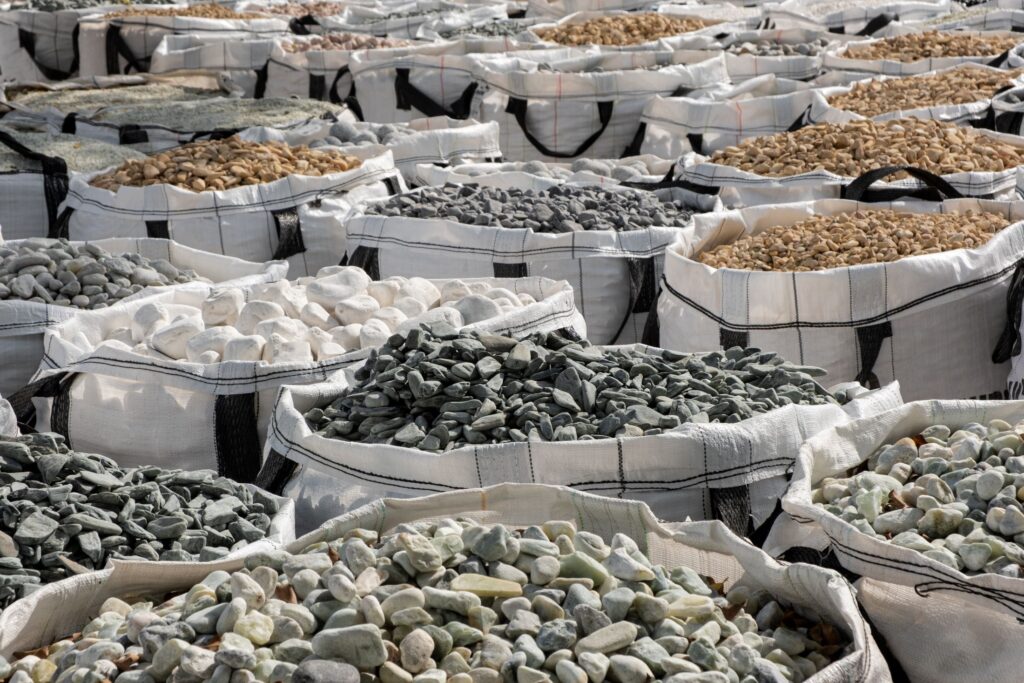(301) 953-1424 • LRASales@laneycompanies.com
(301) 953-1424 • LRASales@laneycompanies.com
Crushed stone is a versatile and essential material used in various construction projects, landscaping, and even for decorative purposes. At Laney Recycling and Aggregates, we receive many questions about this popular material. Here are some frequently asked questions about crushed stone to help you understand its uses, benefits, and applications.

Crushed stone is a construction material made by mechanically crushing large rocks into smaller pieces. These stones come in various sizes and can be used for multiple applications, ranging from construction to landscaping. The type of rock used for crushed stone can vary. Common types include limestone, granite, trap rock, and sandstone. Each type has its unique properties, making it suitable for specific uses.
Crushed stone is widely used in construction for various purposes. As a base material, it provides a stable foundation for roads, driveways, and foundations. It is also an essential ingredient in concrete, offering strength and durability. Additionally, crushed stone is used in drainage systems to facilitate water movement and prevent erosion.
In landscaping, crushed stone is valued for its aesthetic appeal and functionality. It is often used for pathways and walkways, providing a durable and attractive surface. Crushed stone also serves as a decorative ground cover in flower beds and around trees, and it helps prevent soil erosion on slopes and in drainage areas.
Crushed stone comes in various sizes, each suited for different applications. The most common sizes include #1 Crushed Stone, which ranges from 2 to 4 inches and is used for large-scale construction projects like highway bases. #57 Crushed Stone, which ranges from 3/4 inch to 1 inch, is used for concrete aggregate, drainage, and landscaping. #8 Crushed Stone, ranging from 3/8 inch to 1/2 inch, is ideal for asphalt mix, decorative ground cover, and walkways. Stone dust, also known as screenings, is the smallest size and is used as a binding agent for pavers and a base for stone paths.
The production of crushed stone begins with the extraction of large rocks from quarries. These rocks are then blasted to break them into manageable sizes. The extracted rocks are fed into crushers, which break them into smaller pieces. These pieces are then screened to separate them into different sizes. The resulting crushed stone is washed to remove any dust and impurities.
Crushed stone is highly durable, making it an excellent choice for construction and landscaping projects that require long-lasting materials. With various sizes and types available, crushed stone is versatile and can be used for multiple applications, from road construction to garden decoration. Crushed stone is also cost-effective compared to other options like asphalt or concrete, providing excellent value for money, especially for large-scale projects.
When choosing the right type of crushed stone, consider the specific requirements of your project. For example, if you need a stable base for a driveway, larger crushed stone like #1 or #57 might be appropriate. For decorative purposes, smaller sizes like #8 or stone dust might be better. For landscaping projects, consider the color and texture of the crushed stone to ensure it complements your overall design. If you’re unsure which type of crushed stone to use, consulting with professionals like those at Laney Recycling and Aggregates can provide valuable guidance and ensure you choose the right material for your needs.
Crushed stone is an essential and versatile material used in a variety of construction and landscaping projects. Understanding its different types, uses, and benefits can help you make informed decisions for your projects. At Laney Recycling and Aggregates, we are committed to providing high-quality crushed stone and expert advice to meet your needs. Contact us today to learn more about our products and services.
Prince George's County: Bowie (20715, 20716, 20720, 20721), Beltsville (20705), Adelphi (20783), College Park (20740,20742), Greenbelt (25689), Hyattsville (20781, 20782, 20783, 20784), Landover (20785), Laurel (20707, 20723), Springdale (20774), Upper Marlboro (20772, 20774), Woodlawn (21207).
Montgomery County: Olney (20832), Damascus (20872), Laytonsville (20882), Silver Spring (20910), Clarksburg (20871), Gaithersburg (20878), Germantown (20876), Bethesda (20816), Chevy Chase (20815), and more.
Howard County: Elkridge (21075), Ellicott City (21043), Fulton (20759), Glenelg (21737), Glenwood (21738), Granite (21163), Hanover (21076), Clarksville (21029), Columbia (21044), Cooksville (21723), Dorsey (21075), Highland (20777), Jessup (20794), Lisbon (21765), Marriottsville (21104), North Laurel (20723), West Friendship (21794), Woodbine (21797), Woodstock (21163), and more.
Anne Arundel County: Annapolis (21401, 21403, 21409), Arnold (21012), Crofton (21114), Crownsville (21032), Gambrills (21054), Glen Burnie (21060, 21061), Hanover (21076), Jessup (20794), Pasadena (21122), Severn (21144), Severna Park (21146).
Baltimore County: Arbutus (21227), Catonsville (21228, 21250), Lansdowne (21227), Lochearn (21207), Cockeysville (21030, 21031, 21065), Dundalk (21222), Pikesville (21208), Randallstown (21133), Reisterstown (21136), Edgemere (21219), Essex (21221), Garrison (21055), Lutherville (21093), Middle River (21220), Milford Mill (21244), Overlea (21236), Owings Mills (21117), Parkville (21234), Park Heights (21215), Rosedale (21237), Timonium (21093), Towson (21204), White Marsh (21162), Woodlawn (21207), and more.
Carroll County: Eldersburg (21784), Finksburg (21048), Hampstead (21074), Manchester (21102), Marriottsville (21104), Taneytown (21787), Union Bridge (21791), Westminster (21157, 21158), Mount Airy (21771), New Windsor (21776), Sykesville (21784), Woodbine (21797), Taneytown (21787), and more.
Frederick County: Frederick (21701, 20702, 21703, 21709), New Market (21774) , Mount Airy (21771), Urbana (21704), Ijamsville (21754), Walkersville (21793), Libertytown (21762), Damascus (20872), and more.
Washington, DC and Northern Virginia
St. Mary's County: Leonardtown (20650), Mechanicsville (20659), Lexington Park (20653), Piney Point (20674), Tall Timbers (20690)
Calvert County: Dunkirk (20754), Chesapeake Beach (20732), North Beach (20714), Prince Frederick (20678), Owings (20736), Solomons (20688).
Charles County: La Plata (20646), Port Tobacco (20677), Rock Point (20682), Waldorf (20601, 20602, 20603)
©2025 The Recycling Center, All Rights Reserved.
Site Designed and Developed by: Advantage Internet Marketing